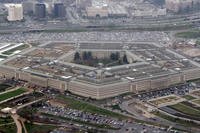U.S. presidents have long used their power of clemency to grant controversial amnesty, commutations or pardons to military personnel.
That power is now in the limelight again thanks to President Donald Trump's rumored plan to pardon several troops before trial or conviction, first reported in The New York Times. Those include Maj. Mathew Golsteyn, a Green Beret accused of killing an unarmed Afghan man; Navy SEAL Chief Eddie Gallagher, who is facing trial after allegedly shooting unarmed civilians and killing a captive Islamic State group fighter; and the Marine scout snipers seen urinating on Taliban corpses in a video that surfaced in 2012.
They wouldn't be Trump's first military pardons. Early this month, he granted a pardon to former Army Lt. Michael Behenna, convicted in 2009 of unpremeditated murder in a combat zone after killing a suspected al-Qaida terrorist. And in March 2018, the president granted a pardon to former Navy Petty Officer 1st Class Kristian Saucier, who in 2016 was convicted of taking photos of the classified areas aboard the nuclear-powered attack submarine Alexandria.
Trump's rumored plans aren't the only time grants of military clemency have been controversial. Here are five other instances you may not remember.
1. Vietnam War Draft Dodgers

After campaigning on the promise of pardons in 1976, a newly sworn-in President Jimmy Carter granted unconditional amnesty to hundreds of thousands of Americans who had failed to register for the draft or who had fled the country to avoid military service during the Vietnam War. Although President Gerald Ford had granted conditional amnesty to some of the draft dodgers, Carter's action left out only military deserters.
2. Iran-Contra Affair Conspirators

An illegal arms sale to Iran and the resulting scandal, known as the Iran-Contra Affair, brought to President Ronald Reagan's administration 11 convictions -- including that of retired Marine Corps Lt. Col. Robert McFarlane, Reagan's national security adviser -- and the indictment of then-Defense Secretary Caspar "Cap" Weinberger, a former Army captain. But during his final days in office, President George H.W. Bush granted pardons to all of those convicted, as well as Weinberger, whose case had not yet gone to trial.
3. Chelsea Manning

After former Army intelligence analyst Chelsea Manning pleaded guilty to multiple charges under the Espionage Act for leaking information to the website WikiLeaks, President Barack Obama in late 2017 commuted her 35-year sentence. Imprisoned at Fort Leavenworth, Kansas, she was released in May 2018, instead of in 2045.
4. Henry O. Flipper

The first Black West Point cadet and a former slave, Flipper was commissioned into the Army in 1877. But in 1881, during a court-martial on a charge of embezzlement for which he was found not guilty, he was instead convicted of "conduct unbecoming an officer and gentleman" and dismissed from the military. He died of natural causes in 1940. In 1994, his descendants applied to the Army for a review of the case, and, in 1999, a posthumous pardon was granted by President Bill Clinton, 118 years after Flipper's conviction.
5. Confederate Troops

On Christmas Day 1868, President Andrew Johnson granted full pardons and amnesty from charges of treason for all Confederate troops who fought against the union in the American Civil War. Prior to his assassination, President Abraham Lincoln had also granted more than 60 pardons for war-related crimes. But neither Johnson nor Lincoln's actions gave full citizenship to former Confederate President Jefferson Davis. It wasn't until 1978 that President Jimmy Carter used his power to posthumously restore Davis as an American with full rights of citizenship.
Want to Know More About the Military?
Be sure to get the latest news about the U.S. military, as well as critical info about how to join and all the benefits of service. Subscribe to Military.com and receive customized updates delivered straight to your inbox.
















